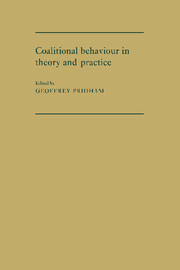Book contents
- Frontmatter
- Contents
- List of illustrations
- List of tables
- Notes on the contributors
- Preface
- 1 An inductive theoretical framework for coalitional behaviour: political parties in multi-dimensional perspective in Western Europe
- 2 Between theoretical elegance and political reality: deductive models and cabinet coalitions in Europe
- 3 Changing coalitional preferences among West German parties
- 4 The FDP and coalitional behaviour in the Federal Republic of Germany: multi-dimensional perspectives on the role of a pivotal party
- 5 Cabinet stability in the French Fourth Republic: the Ramadier coalition government of 1947
- 6 Coalition formation and maintenance in Belgium: a case-study of elite behaviour and changing cleavage structure, 1965–1981
- 7 The Dutch Christian Democratic party and coalitional behaviour in the Netherlands: a pivotal party in the face of depillarisation
- 8 Coalition or Fianna Fail? The politics of inter-party government in Ireland
- 9 Italy's party democracy and coalitional behaviour: a case-study in multi-dimensionality
- 10 Party coalitions in the first democratic period in Spain, 1977–1982
- 11 Coalitional theory and practice in Scandinavia
- 12 Multi-dimensional approaches to the study of local coalitions: some cross-national comparisons
- 13 Research notes
- Index
1 - An inductive theoretical framework for coalitional behaviour: political parties in multi-dimensional perspective in Western Europe
Published online by Cambridge University Press: 05 November 2011
- Frontmatter
- Contents
- List of illustrations
- List of tables
- Notes on the contributors
- Preface
- 1 An inductive theoretical framework for coalitional behaviour: political parties in multi-dimensional perspective in Western Europe
- 2 Between theoretical elegance and political reality: deductive models and cabinet coalitions in Europe
- 3 Changing coalitional preferences among West German parties
- 4 The FDP and coalitional behaviour in the Federal Republic of Germany: multi-dimensional perspectives on the role of a pivotal party
- 5 Cabinet stability in the French Fourth Republic: the Ramadier coalition government of 1947
- 6 Coalition formation and maintenance in Belgium: a case-study of elite behaviour and changing cleavage structure, 1965–1981
- 7 The Dutch Christian Democratic party and coalitional behaviour in the Netherlands: a pivotal party in the face of depillarisation
- 8 Coalition or Fianna Fail? The politics of inter-party government in Ireland
- 9 Italy's party democracy and coalitional behaviour: a case-study in multi-dimensionality
- 10 Party coalitions in the first democratic period in Spain, 1977–1982
- 11 Coalitional theory and practice in Scandinavia
- 12 Multi-dimensional approaches to the study of local coalitions: some cross-national comparisons
- 13 Research notes
- Index
Summary
The importance of multi-dimensional approaches in coalition analysis
Coalition studies are strongly in need of rethinking in terms of theoretical approaches, particularly with respect to contextual factors which influence behaviour. This is a very basic need because of the long neglect of such factors in empirical research on this subject despite their obvious importance in political reality. The pioneering theoretical frameworks for the analysis of coalition formation developed in the 1960s and early 1970s, while certainly still useful in pointing directions in coalition studies, have increasingly been found inadequate for handling the complexities of this subject. These were based on simple and direct applications of mathematical models of n-person game theory. Already, some attempt has recently been made to satisfy the demand for new and systematic knowledge, especially on Western Europe, such as by the welcome volumes edited by Eric C. Browne and John Dreijmanis and by Vernon Bogdanor. Although these tend to question the applicability of the formal coalition theories, they do not really seek to think anew theoretical approaches in any comprehensive way.
This deficiency is not for lack of any indications about how to pursue such an endeavour, as discussed below in the relevant literature on political parties. From this it emerges that any reworking of coalition theory should be multidimensional in approach, and that it should in particular focus on linkages between coalition politics and theories of party systems, seeing that political parties have always been acknowledged by coalition theorists as the central actors in the game.
- Type
- Chapter
- Information
- Coalitional Behaviour in Theory and PracticeAn Inductive Model for Western Europe, pp. 1 - 31Publisher: Cambridge University PressPrint publication year: 1986
- 2
- Cited by

